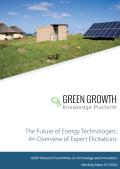A new economic paradigm is emerging that is going to dramatically change the way we organize economic life on the planet. The European Union is embarking on a bold new course to create a high-tech 21st century smart green digital economy, making Europe potentially the most productive commercial space in the world and the most ecologically sustainable society on Earth. The plan is called Digital Europe. The EU vision of a green digital economy is now being embraced by China and other developing nations around the world.
In this expanded digital economy, private enterprises connected to the Internet of Things can use Big Data and analytics to develop algorithms that speed efficiency, increase productivity and dramatically lower the marginal cost of producing and distributing goods and services, making European businesses more competitive in an emerging post-carbon global marketplace
Eco-innovation has been identified as one of the key drivers of change that need to be harnessed for a sustainable future. Given the complexity of eco-innovation as a concept, there are various challenges to measuring its progress. This CEPS Working Document briefly explores the evolution of the concept of eco-innovation and emphasises its role in the EU 2020 strategy. It then gives an overview of the different measurement approaches and challenges associated with identifying and using indicators for measuring progress in eco-innovation. Within this context, the paper describes the added value and key features of the www.measuring-progress.eu web tool, which aims to improve the way in which policy-makers and others involved in the policy process can access, understand and use green economy and eco-innovation indicators. The web tool was developed as part of a systematic overview by the NETGREEN project research team of the large and fragmented body of work in the field of green economy indicators. The paper concludes with a number of messages for policy-makers in this field.
The green growth transition will be large, system-wide and structural. In other words, a new industrial revolution. This will require new green growth policies that foster economic growth and development while ensuring that natural assets continue to provide the resources and environmental services on which our well-being relies (OECD, 2011). More and better evidence is needed to support the design of effective green growth policies and to understand their impact on the economy. This policy brief summarises the main policy implications of a two-year research programme, sponsored by the Global Green Growth Institute (GGGI), which aimed to contribute to the growing evidence base.

This report presents the conclusions of the independent expert group on the 'Follow-up to Rio+20, notably the sustainable development goals (SDGs)' that was established by the European Commission (EC) to provide advice on the role of science, technology and innovation (STI) for implementing the new global sustainable development agenda (2030 Agenda). The group gives recommendations, both in terms of general policy orientations and concrete areas of engagement, for EU STI policy to contribute to the implementation of the 2030 Agenda in Europe and beyond, as well as for possible engagement in international initiatives concerning STI. It recommends the EU to capitalise on its Horizon 2020 research and innovation programme, which is seeking to invest more than 60% of its budget for sustainable development and is fully open to international participation.
